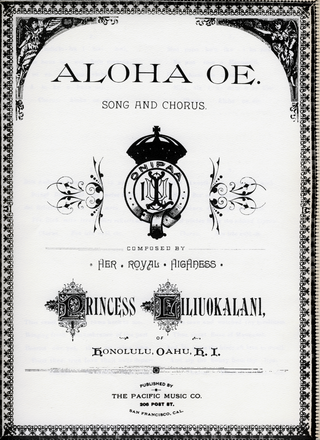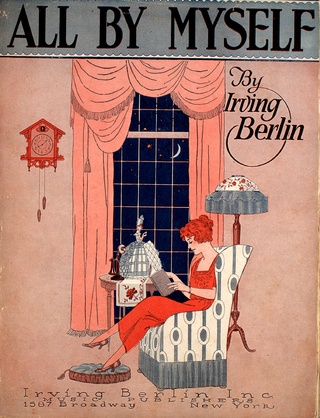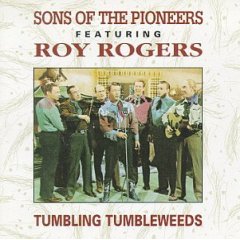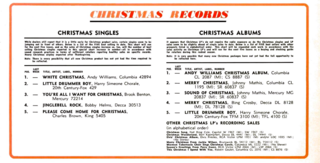Related Research Articles
"Around the World" is the theme tune from the 1956 movie Around the World in 80 Days. In the film, only an instrumental version of the song appeared, although the vocal version has become the better known one. The song was written by Harold Adamson and Victor Young; Young died in 1956, several weeks after the film's release, and he received the Academy Award for Best Music, Scoring of a Dramatic or Comedy Picture posthumously. Young's orchestral version was a #13 hit on the Billboard charts in 1957. The recording by Bing Crosby was the B-side of the Victor Young version in 1957, on Festival SP45-1274 in Australia, and was a joint charting success.
"I Really Don't Want to Know" is a popular song written by Don Robertson (music) Howard Barnes (lyrics). The song was published in 1953.

"Aloha ʻOe" is a Hawaiian folk song written c. 1878 by Liliʻuokalani, who was then Princess of the Hawaiian Kingdom. It is her most famous song and is a common cultural symbol for Hawaii.
"Have I Told You Lately That I Love You?" is a popular song written by Scotty Wiseman for the 1944 musical film, Sing, Neighbor, Sing and performed by Lulu Belle and Scotty. It was their greatest hit and one of the first country music songs to attract major attention in the pop music field. Although the song was featured in the movie, it was not released by Lulu Belle and Scotty until 1947. The first released version of this song was by Gene Autry in 1945.

"I'll See You in My Dreams" is a popular song and jazz standard, composed by Isham Jones, with lyrics by Gus Kahn, and published in 1924. It was recorded on December 4 that year, by Isham Jones conducting Ray Miller's Orchestra. Released on Brunswick Records, it charted for 16 weeks during 1925, spending seven weeks at number 1 in the United States. Other popular versions in 1925 were by Marion Harris; Paul Whiteman; Ford & Glenn; and Lewis James; with three of these four reaching the Top 10.

"Sweet Leilani" is a song featured in the 1937 film, Waikiki Wedding. It won the Academy Award for Best Original Song, and Bing Crosby's record became one of the biggest hits of 1937.
"Hello, Young Lovers" is a show tune from the 1951 Rodgers and Hammerstein musical, The King and I. It is sung by Anna, played by Gertrude Lawrence in the original Broadway production; by Valerie Hobson in the original London West End production; and by Deborah Kerr in the film version.
"Sunday, Monday or Always" is a 1943 popular song with music by Jimmy Van Heusen and lyrics by Johnny Burke.

Aloha from Hawaii via Satellite is a live album by American singer and musician Elvis Presley, released by RCA Records in February 1973. The album consists of recordings from Presley's January 1973 concert of the same name. It peaked at number one on the Billboard chart in the spring of the same year. Despite the satellite innovation, the concert did not air in the United States until April 4. Aloha from Hawaii went to number one on the Billboard album chart. The album dominated the charts, reaching number one on both the pop and country charts in the US.
"Witchcraft" is a popular song from 1957 composed by Cy Coleman with lyrics by Carolyn Leigh.
"Blue Hawaii" is a popular song written by Leo Robin and Ralph Rainger for the 1937 Paramount Pictures film Waikiki Wedding, starring Bing Crosby and Shirley Ross. Crosby recorded a version with backing by Lani McIntyre and His Hawaiians, which was released in 1937 as the B-side of "Sweet Leilani." This reached the No. 5 spot in the charts of the day during a 13-week-stay

Blue Hawaii is the fourth soundtrack album by the American singer Elvis Presley, released on RCA Victor Records in mono and stereo, LPM/LSP 2426, on October 20, 1961. It is the soundtrack to the 1961 film of the same name starring Presley. In the United States, the album spent 20 weeks at the number one slot and 39 weeks in the Top 10 on Billboard's Top Pop LPs chart. It was certified Gold on December 21, 1961, Platinum and 2× Platinum on March 27, 1992, and 3× Platinum on July 30, 2002, by the Recording Industry Association of America. On the US Top Pop Albums chart, Blue Hawaii is second only to the soundtrack of West Side Story as the most successful soundtrack album of the 1960s.

"All by Myself" is a popular song written by Irving Berlin, published in 1921.

"Tumbling Tumbleweeds" is a Western music song composed by Bob Nolan, a founding member of the Sons of the Pioneers. Nolan wrote the song in the early 1930s while he was working as a caddy and living in Los Angeles. It was first recorded by the Sons of the Pioneers in 1934, and it became one of the most famous songs associated with the group. Originally titled "Tumbling Leaves", the song was reworked into the title "Tumbling Tumbleweeds" and into more widespread fame with the 1935 film of the same name starring Gene Autry. Members of the Western Writers of America chose it as one of the Top 100 Western songs of all time.
"Walking the Floor Over You" is a country music song written by Ernest Tubb, recorded on April 26, 1941 in Fort Worth, Texas, and released in the United States that year.
"Beyond The Reef" is a song written by Canadian Jack Pitman in Hawaii in 1948. It was first performed by Hawaiian artist Napua Stevens in 1949.

To You Sweetheart, Aloha is the fourth studio album by American pop singer Andy Williams and was released late in the summer of 1959 by Cadence Records. This, his fourth LP for the label, has a Hawaiian theme that coincides with the admission of the 50th of the United States.
"Lonely Street" is a 1956 song written by Carl Belew, Kenny Sowder, and W.S. Stevenson, originally performed by Belew, and later by Dave Rich.
"The Moon of Manakoora" is a popular song written by Frank Loesser (lyrics) and Alfred Newman (music) for the 1937 Paramount film The Hurricane starring Dorothy Lamour. Lamour sang the song in the film and also made a commercial recording of it. The song "The Moon of Manakoora" is considered a standard and was Loesser's first success as a lyric writer.

Billboard magazine only charted Christmas singles and albums along with the other popular non-holiday records until the 1958 holiday season when they published their first section that surveys only Christmas music.
References
- ↑ Andy Williams, "The Hawaiian Wedding Song" Retrieved June 5, 2013
- ↑ Roberts, David (2006). British Hit Singles & Albums (19th ed.). London: Guinness World Records Limited. p. 467. ISBN 1-904994-10-5.
- ↑ "A Bing Crosby Discography". BING magazine. International Club Crosby. Retrieved September 14, 2017.
- ↑ "Discogs.com". Discogs.com. 1981. Retrieved September 14, 2017.
- ↑ "Discogs.com". Discogs.com. 1962. Retrieved September 14, 2017.
- ↑ "Discogs.com". Discogs.com. 1961. Retrieved September 14, 2017.
- ↑ "Discogs.com". Discogs.com. 1962. Retrieved September 14, 2017.
- ↑ "Discogs.com". Discogs.com. 1965. Retrieved September 14, 2017.
- ↑ "Discogs.com". Discogs.com. 1963. Retrieved September 14, 2017.
- ↑ "Discogs.com". Discogs.com. 1963. Retrieved September 14, 2017.
- ↑ "Discogs.com". Discogs.com. 1990. Retrieved September 14, 2017.
- ↑ "Discogs.com". Discogs.com. 1976. Retrieved September 14, 2017.
- ↑ "Wikipedia.com".